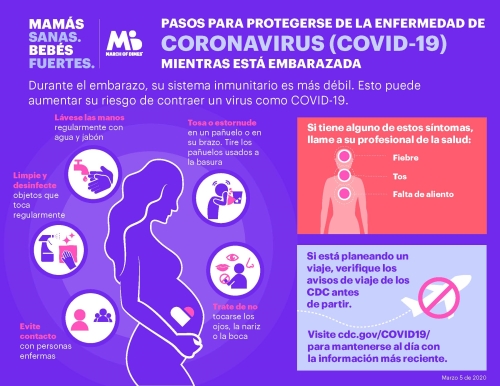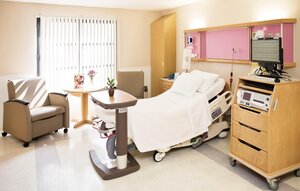Maternity Services
The birth of a baby is a special event. At Whittier Hospital Medical Center, we believe that the best beginning starts with the bond between mother, baby and family.
We understand that each mother is different, each family unique, and each baby remarkable.
Our goal is to exceed expectations in providing quality, compassionate care throughout the childbirth experience and beyond. Everyone from physicians, nurses and support staff provides each mother with a personalized birth experience.
Hospital support practices allow mothers to become more confident and successful in their breastfeeding. The experience does not end when mom and baby leave the hospital. Whittier Hospital Medical Center is available for moms and babies 24/7/365.
If you have questions about maternity services, please contact Perinatal Services Administration at 562.907.1538.
What We Offer:
Caring and friendly staff
Labor/Delivery/Recovery Rooms(LDR)
Private rooms
Financial Application Assistance. We can help you apply for Medi-Cal
WIC referral
We accept most health insurance plans, and we offer a low-cost cash package
Breastfeeding support with available lactation consultant
To celebrate this special occasion, we offer a candlelight dinner for the new mom and significant other
Birth certificates and Baby's Social Security Processed On Site
Click below and obtaIn a Maternity Services Guide in your preferred language.
Maternity Services Guide (English)
Maternity Services Guide (Spanish)
Maternity Services Guide(Chinese)
Visitor Information
Labor and Delivery Unit
To provide an environment where the patient can be supported by family members during their hospitalization yet allow clinical staff to provide the highest level of safe patient care, visitors will be allowed in LDR based upon the patient’s condition and at the discretion of the nurse in consultation with the patient.
• All visitors must be over the age of 13 in LD
• Visitors will be limited to 2 persons.
Visitors MUST wear a special Labor/Delivery armband.
In Labor and Delivery the 2 designated visitors WILL NOT be able to switch during the labor process.
Immediately after delivery only the same 2 coaches or persons will be allowed to remain at the discretion of the mother. There will be no switching out of visitors so adequate time can be provided to allow for family bonding and when skin to skin and initial breastfeeding is started with the mother and baby.
Postpartum Unit
Visiting hours are open 24 hours per day, with the following exceptions:
. May be limited during “Mother/Baby Quiet Time” from 2pm to 4pm.
Only one visitor is permitted to stay overnight after hospital visiting hours have ended.
3 visitors MAX in the PP room at one time. Visitors can switch in and out of PP unit at the patients discretion.
Siblings under the age of 13 will be permitted ONLY if an adult is present to monitor the children for the entire visit and the visit is brief.
Children MAY NOT spend the night in the PP unit under any circumstances.
Maternity Tours
We invite to take a tour of the maternity unit where you can meet our staff and visit the labor/delivery and post-partum rooms.
Maternity Tours take place every third Friday of the month at 11:00 am. Tours last about an hour and they will help you become familiarized with our facility and prepare you for what to expect when you arrive for the delivery of your baby. You are welcome to bring one adult guest with you (no children please).
You will receive a packet with important information such as a registration form, educational tips and more.
Reservations are required. To RSVP please email us at whmc4u@ahmchealth.com. Please indicate in your email mother's name, name of the physician and approximate date of delivery.
For additional information, you may call 562.464.6347.
For physician referrals, please visit the "Find a Doctor" page or call 562.464.6347.
For a referral to the Comprehensive Perinatal Services Program, please call 562.464.6347 or email us at whmc4U@ahmchealth.com.
Novel Coronavirus (COVID-19)

Guidance for Pregnant Women
Los Angeles County Department of Public Health www.publichealth.lacounty.govThere is a lot more to learn about infection with the novel coronavirus in pregnancy but the Los Angeles County Department of Public Health (DPH) wants to share the best information we have now so you can make good decisions about your own care and keep yourself and your baby healthy.
Key Points
1. Take extra care to avoid getting sick while you are pregnant.2. We don't yet know if the virus that causes COVID-19 poses a risk during pregnancy. There have been a few reports of preterm birth in women who were infected, but it is not clear whether these cases were caused by the virus or by other causes.
3. Even though we don't fully understand the risks of the virus, most women who have become sick during pregnancy so far have gone on to have babies that don't show any signs of harm.
4. Mothers who are infected with CODIV-19 can breastfeed. If you are sick, you can take simple steps so your baby doesn't become sick.
Special concerns in pregnancy
Pregnant women are at higher risk than other people from diseases caused by infection. This is because the immune system tunes down during pregnancy so that the mother's body doesn't reject the fetus. There is no evidence so far that pregnant women are getting CODIV-19 more often than other women, but we don't know enough to say for sure. So, it makes sense to be extra careful.One symptom of the COVID-19 infection can be a high fever. We don't know just how much of a risk fever is for human babies, but it makes sense not to take chances. If you are pregnant and you get sick, make sure you connect with your health care provider early.
How to minimize risk?
Practice every day personal protection practices. Do all the things everyone should do to avoid catching the virus, but with a little extra care:Stay home - avoid contact with people who are sick.
If you are an essential employee and must continue working, ask about teleworking or flexing your hours so you are traveling and at work when there are fewer people around.
Talk to your doctor or midwife about your prenatal visits. They may be able to use telemedicine for some of your visits, or schedule visits when their office is not crowded.
Have food delivered to your home so you can avoid checkout lines at grocery stores. o Ask if family, social, or commercial networks can bring food to you.
If you are enrolled in WIC, ask your WIC program if you can participate without having to come into the WIC office or have food delivered to your home.
Take extra care with infection control
Wash your hands often with soap and water for at least 20 seconds, especially after blowing your nose, coughing, or sneezing, or using the restroom.
If soap and water are not available, use a hand sanitizer that contains at least 60% alcohol.
To the extent possible, avoid touching high-touch surfaces in public places - elevator buttons, door handles, and handrails
Wash your hands after touching surfaces in public places.
Avoid touching objects or surfaces, then touching your mouth, nose, or eyes before washing your hands
Clean and disinfect your home to remove germs: practice routine cleaning of frequently touched surfaces (for example: tables, doorknobs, light switches, handles, desks, toilets, faucets, sinks & cell phones)
Avoid crowds, especially in poorly ventilated spaces. Your risk of exposure to respiratory viruses like COVID-19 may increase in crowded, closed-in settings with little air circulation if there are people in the crowd who are sick.
Avoid cruise travel and non-essential air travel.
What to do if you get sick while pregnant
Prepare in advance for this possibility. Make sure you'll be able to manage if you get sick- Consult with your health care provider about symptoms of COVID-19 that you should watch for. These generally include fever, cough or difficulty breathing.
- Ask your doctor what over-the-counter medications would be safest if you get sick, and then make sure to have those products on hand, along with tissues and anything else you'll need to be comfortable if you are sick at home.
- Try to have important items like medications and supplies (like tissues) in advance if you can.
Stay in touch with other people by phone or email. Let them know you are taking extra care to avoid getting sick and ask for help if you need it.
If you get sick: Stay home! Call your doctor and let them know about your symptoms. You may want to contact both your regular doctor and your obstetrician or midwife in case they have any special guidance to keep your pregnancy safe.
- Most pregnant women who have gotten sick in other parts of the world have not had to go to the hospital, so if you get sick you will probably be able to stay home. Take care of yourself as you would with a cold or the flu: rest, drink liquids, use over-the-counter medications that your doctor recommends to control fever.
If you get help from a home visitor, a doula, WIC or any other pregnancy support program, be sure to call ahead and let them know you are sick and ask for help with home food delivery and other needs. You can also turn to them for emotional support and if getting sick while you are pregnant is getting you down.
Get medical attention immediately if your condition gets worse. Signs to look for are:
- Very high fever
- Difficulty breathing or shortness of breath
- Persistent pain or pressure in the chest
- Mental confusion
- Bluish lips or face
When the baby comes
If you are infected at the time of delivery, current guidelines call for doctors to proceed with whatever type of delivery (vaginal or C-section) was already planned unless there is some other reason to make a change in plans. Your hospital may take extra precautions to keep you, the baby, and healthcare staff safe during the delivery.If you are infected at the time of delivery, your doctor will also try to assure that the baby stays safe while you recover. This may mean having the baby in a separate room or taking extra care that you wash your hands and wear a mask before holding the baby.
Things to know about breastfeeding
Breast milk provides protection against many illnesses and is therefore important for your baby. In fact, as in almost all cases, breast milk is the best food you can give your baby.If you are trying to breastfeed while you are sick, o Wash your hands before touching the baby
Wear a face mask, if possible, while feeding at the breast.
- If expressing breast milk with a breast pump, wash your hands before touching any pump or bottle part and get instructions from hospital staff about cleaning the pump after each use.
- If possible, consider having someone who is well feed the expressed breast milk to the infant.
Stay positive!
Use your social supports.Stay connected to friends and family and ask them for help with food needs, caring for older children and emotional support
Build and maintain your virtual community.
Enlist the help of your partner or the baby's father.
Expect to recover without lasting harm and to have a healthy baby.
If you feel panicked or anxious, seek help from friends, family, your pregnancy support program or a mental health professional.
If you need support or information of any kind during pregnancy or if you are feeling low and want to find someone to talk to, call 213-639-6439.
Resources
CDC Guidance of Pregnancy and BreastfeedingLos Angeles County Department of Mental Health Access Center 24/7 Helpline: (800) 854-7771, (562) 651-2549 TDD/TTY
Los Angeles County Department of Public Health
Call 2-1-1 for more information

